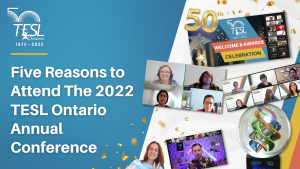Guest Contributors: Allyson Eamer, Amea Wilbur, Katie Crossman, Jennifer Allore

Guest Contributors: Allyson Eamer, Amea Wilbur, Katie Crossman, Jennifer Allore

Introduction
In 2018, Beth Beardall posted that reading advances learner grammar comprehension, vocabulary, writing skills, critical thinking skills and speaking fluency in the post Reading, Reading, Reading. Why it is so important! One way to assist your learners with reading is to encourage them to use the Microsoft Immersive Reader tool.
Continue readingI recently had the pleasure of delving into TESL Ontario’s past by reading through decades of annual reports, Contact magazines, conference reports and other historical documents. It was fascinating to discover this organization’s rich and remarkable history, and to uncover TESL Ontario’s role in the development of the TESL profession over the past 50 years.
In a recent interview with some of TESL Ontario’s most influential members, (a project we are developing for our 50th anniversary celebrations at the conference), Shailja Verma stated “TESL Ontario has taken us from church basements to recognized institutions and buildings.”
Continue readingWhile I am sure most instructors have begun classes for the fall term, perhaps you have new students trickling in – or haven’t had a chance to do a “get-to-know-you activity. Follow the link below to read Cecilia’s ideas from her October 2014 post.
http://blog.teslontario.org/get-to-know-activities-in-the-language-classroom/
 TESL Ontario’s landmark 50th annual conference, Celebrating 50 Years of Community, Leadership and Innovation, will be here in no time! The conference, taking place October 26-28, will once again be held virtually to prioritize the safety of all of our attendees.
TESL Ontario’s landmark 50th annual conference, Celebrating 50 Years of Community, Leadership and Innovation, will be here in no time! The conference, taking place October 26-28, will once again be held virtually to prioritize the safety of all of our attendees.
Here are just a few key reasons why you should mark your calendar now and make plans to join us in October!
Continue reading
When we went back to class in March, my students appeared larger than life. More human, tangible. Lots of smiles, welcoming faces, laughter, and excitement. They had a willingness to learn and interact with each other, as well as with the teacher.
I was curious to see how teaching would function in a “post-COVID-19” period. I was happy to see them in class.
I developed a learn-as-you-go approach. I didn’t know who would attend on a day-to-day basis and hoped more students of various backgrounds would join.
Continue readingFor all ESL teachers, observing other teachers and being observed are not uncommon parts of the job, especially for those who are at the early stages of teaching. Many novice and inexperienced teachers wouldn’t mind it; on the contrary, they appreciate the opportunity to observe more seasoned teachers.
Continue readingWhat is self-reflection in learning?
It is a cognitive awareness that occurs when students are aware of and can articulate what they know and what they need to learn. Thus, it examines the ways an individual learns.
Self-reflection is a huge and often overlooked part of education. While students are often asked to reflect on their own learning, their teachers typically do not coach them in how to do it most effectively. We already know that teacher reflection is a very important part of our professional development. TESL training usually offers great opportunities to learn how to do that. But students have similar needs. Neither teachers nor students can maximally improve their performance without self-reflection.
Continue readingHello everyone! My name is Interlanguage and I’m here to share my transformational journey with you! A journey which was supposed to take me to my dreamland of Second Language! Instead, this journey made me an excellent version of myself!
Continue reading